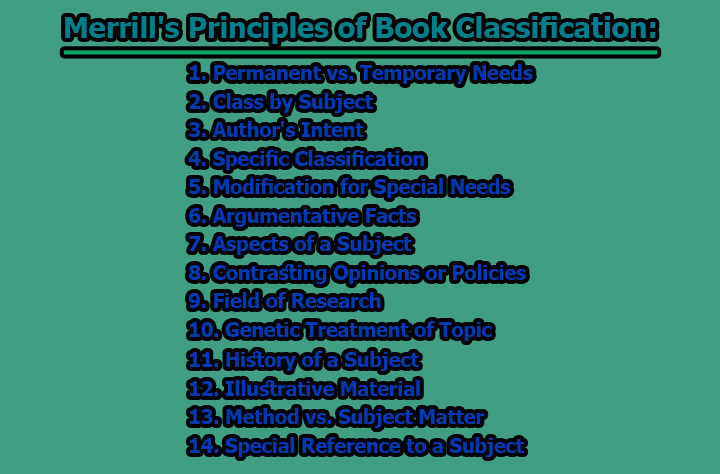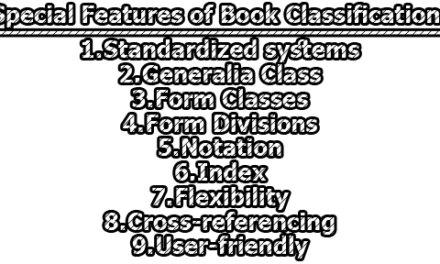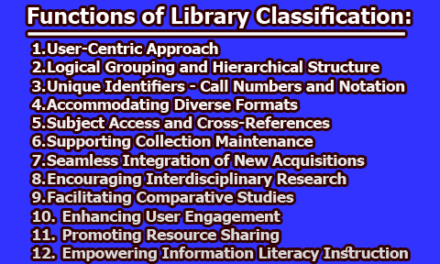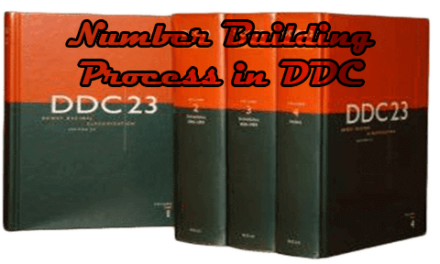Merrill’s Principles of Book Classification:
William Stetson Merrill of Newberry Library proposed a set of principles for library classification, known as Merrill’s Principles of Book Classification. These principles are designed to guide the organization of books in a library in a logical and user-friendly manner. Here are the principles:
1. Permanent vs. Temporary Needs: This principle emphasizes classifying books based on their long-term usefulness rather than short-term or transient interests. For example, a book on a popular trend may have a temporary surge in demand but should still be categorized under its main subject matter for future reference, even if the trend fades.
2. Class by Subject: Books should primarily be organized by their main subject matter. This means grouping all books with similar topics together, allowing library users to find related materials in one location. For instance, all books on astronomy should be placed in the same section.
3. Author’s Intent: When classifying a book, consider the author’s intended purpose in writing it. This helps ensure that books are placed where they are most relevant, based on the author’s goals, rather than just the content alone.
4. Specific Classification: Books should be classified under the most specific topic that accurately represents their content. If there are no specific sub-divisions for a subject, a work discussing local conditions should be placed directly under the broader topic, rather than in a separate, unrelated category.
5. Modification for Special Needs: This principle allows for flexibility in the classification system to accommodate special needs or specific types of library services. For example, a library serving a specialized academic community might create unique classifications to meet the needs of its users.
6. Argumentative Facts: When classifying books containing facts or data used to support a particular argument or policy, prioritize the author’s intended purpose rather than the nature of the material. This ensures that books are grouped based on their argumentative context.
7. Aspects of a Subject: Classify books under the subject they illustrate, not based on the subject suggested by certain aspects of the content. The goal is to categorize books in a way that accurately represents their primary subject matter.
8. Contrasting Opinions or Policies: When a book contrasts two opinions, with one advocated by the author and the other opposed, it should be classified under the opinion or policy advocated by the author. This maintains consistency in the classification system.
9. Field of Research: Books presenting research findings in a specific field should be classified under the topic they investigate, regardless of the data or methods used. This helps users find research materials related to specific subjects.
10. Genetic Treatment of Topic: Classify books under the topic they are derived from or supposed to be derived from, rather than under their origin. This ensures that books are grouped based on their content rather than their historical development.
11. History of a Subject: Even when a subject’s history section lacks sub-divisions, classify a book under the specific heading if it pertains to that subject. This maintains consistency in the classification system.
12. Illustrative Material: If a book focuses on a specific topic and provides illustrations related to a broader topic, classify it under the specific topic. This complements the abstract topic and helps users find materials with specific illustrations.
13. Method vs. Subject Matter: When a book discusses the results of applying a specific method or theory to investigate a subject, classify it under the subject investigated, not under the method itself. This keeps the focus on the subject matter.
14. Special Reference to a Subject: Works that treat a topic with special reference to a country, person, or subject should be classified under the more specific topic to ensure accurate categorization.
These principles collectively provide a structured framework for library classification, enabling efficient organization and retrieval of books while accommodating variations in content and user needs.

Library Lecturer at Nurul Amin Degree College










